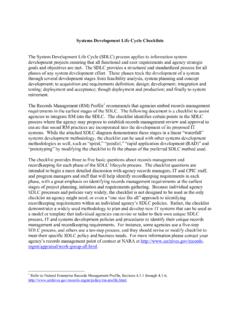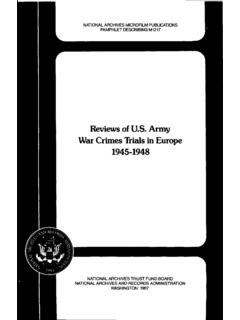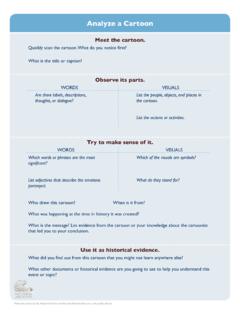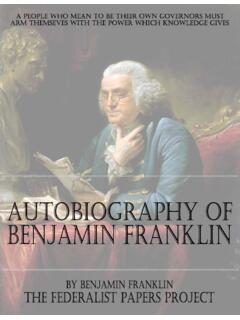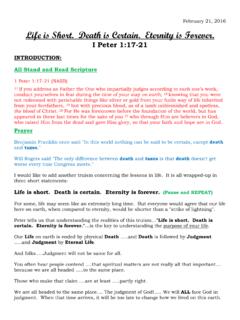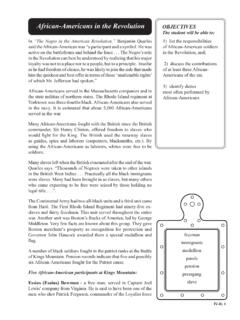Transcription of The Men Who Signed the Treaty of Paris - Archives
1 The Men Who Signed the Treaty of Paris October 3, 2008 The legacy of the Treaty of Paris , Signed on September 3, 1783, has been much greater than was ever anticipated by its American and British negotiators. On October 3, A panel of historians discussed the Treaty signers: Gregg L. Lint, editor of The Adams Papers, Massachusetts Historical Society; Carla Mulford, professor of English, Penn State University; and author of benjamin franklin and the Ends of Empire; Walter Stahr, author of John Jay; and William Anthony Hay, assistant professor, Mississippi State University, representing British signer David Hartley. Former Archivist of the United States Allen Weinstein served as moderator, and the Librarian and Archivist of Canada Ian E. Wilson made opening remarks.
2 This program was presented in partnership with the Embassy of Canada. ALLEN WEINSTEIN: Good evening. AUDIENCE: Good evening. WEINSTEIN: Thank you. Good evening. Actually, can I have that a little louder? Good evening. AUDIENCE: Good evening. WEINSTEIN: Better. Thank you. I'm Allen Weinstein. And the last time I looked, I was Archivist of the United States. And I hope that holds true for this panel. Welcome to the National Archives and to the William G. McGowan Theater. Tonight, we will discuss the men who, 225 years ago, Signed the Treaty of Paris , the subject of the exhibit that opened here today in the O'Brien gallery upstairs, an exhibit which we call "1783: Subject or Citizen?" How many of you have had a chance to go up and see the exhibit?
3 Do. You'll enjoy it. The Treaty is arguably one of the most important documents in American history, part of the collection of documents from the Confederation period, which ended with the writing and adoption of our Constitution. By bringing to a close the Revolutionary War and establishing the United States as a sovereign nation, the Treaty posed difficult choices for those living in what was then known as British North America. It forced them to decide whether they wanted to break with King George III and become, in quotation marks, "citizens" of the new United States or remain loyal "subjects," again in quotation marks, of the British Crown and become part of what is now Canada. Moreover, although the Treaty officially ended the war, it took decades to resolve contentious issues of borders and territory, fishing rights and compensation of losses.
4 People who had no part in either drafting the agreement had their futures as subjects or as citizens rewritten by the lines on the map and by the terms of the Treaty written far away by a handful of men. Tonight's program focuses on the 4 signers of the Treaty -- benjamin franklin , John Adams, John Jay representing the United States--What a powerhouse--and David Hartley, the representative of George III. But first, before proceeding into the program, I would like to introduce a man who is no stranger here to the Archives , the National Archives of the United States--the Librarian and Archivist of Canada--my friend, my colleague, my collaborator--Ian Wilson. Ian? [Applause] IAN WILSON: Good evening, ladies and gentlemen, friends, colleagues, distinguished historians.
5 It's a privilege to be back here once again at the National Archives and Records Administration in Washington--one of the great institutions of this country and of this continent--to continue our collaboration and our partnership focused and built around, in this instance, the Treaty of Paris of 1783--a document fundamental, key to both of our countries, and helping define our relationship. It's over the years and over the decades, the National Archives and Records Administration and the Library and Archives of Canada have collaborated on many areas in terms of professional development and professional practice. We've worked together in many areas. I think jointly we lead the world. But now we've taken this public, we've taken it beyond and put on exhibit some of our treasures that illuminate and deal with one of the key junctures of our shared history on this continent.
6 "The Treaty of Paris , 1783, Subject or Citizen?" It reminds me of one of the famous quotations of our first prime minister--Sir John A. McDonald, who became prime minister in 1867, was prime minister pretty much through to his death--or a period of 4 years the opposition was in. But he continued as prime minister, and one of his famous quotations that was on many election posters, "A British subject I was born, a British subject I will die." And he did. He was a British subject and proud of it. And certainly the Loyalist influences had a fundamental influence on shaping the character of that great country to the north. But we're here tonight to, I think, celebrate biography and the writing of political biography, inspired by our exhibition, certainly, but building, I think, on the work of a number of distinguished historians.
7 Really focusing on the role of the individual in achieving and dealing with the great decisions of their time and trying to understand the great events of the past through their eyes. And the Treaty of Paris certainly is one of the, as Dr. Weinstein has already mentioned, one of the fundamental documents of the United States. In many ways, I think it completed the Declaration of Independence, for it provided international recognition and international ratification of the dreams and the ambitions that were first articulated in the Declaration of Independence. And I think through biography, one can come to understand the issues of the day and of the decisions that had to be made. And there were many decisions that ultimately every citizen had to make. The times at the end of the War of Independence were fraught with danger and difficult decisions for governments, for families, and for individuals.
8 The documents that are in this exhibit, as well as the Treaty itself, bring to an end the civil war, and address the issues of borders, of immigration, rebuilding communities and lives. And these were the lives of everyday North Americans white, black, British, German, French, Spanish, First Nations, Patriots or Tories, Rebels or Loyalists. The signing forced thousands of people and all families to make major life altering decisions, often painful. Many lost community, many broke with family, many lost friends, many went to seek their future elsewhere in very uncertain conditions. It's all about processes, and launched in the process nation building, and began to define national character on both sides of the new border defined by the Treaty of Paris .
9 I know biographers are well aware of the joys and frustrations of doing archival research and of searching for that one clue and that one detail. And I think in what we are experiencing right now as archivists across North America, as we put more and more material on-line, as we put those detailed records of population and the census, the service records and the war files of different wars, as we put immigration lists and passenger ship lists, of city directories, our citizens are discovering for the very first time themselves the depth, the extent of the records that have been preserved and maintained in our respective Archives . They're finding themselves. They're finding their families and their community history is moving to first person, singular.
10 "My history, my family, my community." And it can be done because I think citizens are discovering for the first time the innate interest that biographers and historians have known about for years. But I think our citizens in an on-line environment are discovering that and are beginning to enjoy for themselves the process of discovery, of interpretation, and of coming to understand our shared pasts through the eyes of the individuals who lived it and who had to make those difficult choices. So I invite everyone to have a look at this exhibit because it brings together resources from both our great institutions. and it uses those to show and try to shed light on the great events and on the individual choices it had to make. So I invite everyone, explore Archives .


